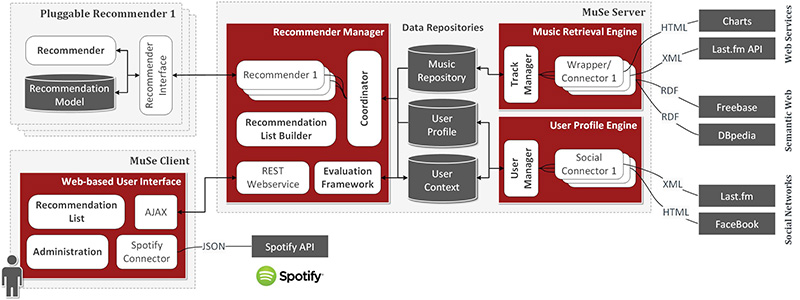MuSe – Music Sensing in a Social Context
With the growing number of social networking sites an abundance of data is available about what users do, and – more specifically – what they do like. One advantage of this phenomenon is that now also sufficient data is available about the so-called long tail of users, who are interested in topics outside of the mainstream. Often, even mainstream users might be interested in the same topics, but are not aware of their existence. On the other side, with the advent of Linked Data new connections between different sources of information enable a more granular classification of items a user might be interested in.
In the MuSe project (Music Sensing in a Social Context), we aim at solutions that incorporate knowledge from diverse sources of information ranging from Social Networks to Linked Data in a highly dynamic way. Last.fm, Freebase, Facebook, Twitter, DBpedia along with many others are accessed dynamically and provide us a wide range of up-to-date data sources that are incorporated and combined in various types of recommendation techniques. This enables us to develop recommenders that not only find more of what the user already liked, e.g. by staying in the same genre, but also try to maximize the serendipity of recommended artists and songs.
MuSe: A Music Recommendation Management System (MRMS)
One important issue in the development of recommender systems is a thorough and significant evaluation of the proposed algorithm. However, some aspects of recommending music are inherently subjective, such as serendipity, and thus the evaluation of such algorithms can only be done in vivo, i.e. with real users and not in an artificial environment. Therefore we developed and open-sourced a system that takes care of all regular tasks that are involved in conducting such evaluation. Our MRMS provides the typical off-the-shelf evaluation algorithms, offers an online evaluation system with automatic reporting, and by integrating online streaming services (Spotify) also a legal possibility to evaluate the quality of recommended songs in real time. Finally, it has a built-in user management system that conforms with state-of-the-art privacy standards. New recommender algorithms can be plugged in comfortably by using our API and evaluations can be configured and managed online.
The code is published under the Apache License v2.0 and available for download.
Discover great music & find songs and artists you will love!
With MuSe, we offer also an online version of our music recommendation system, that enables users to try out a large variety of new music recommender algorithms and provides developers a playground to perform experiments with real users. The whole plattform corresponds with german privacy standards and is updated regulary with new versions of our MRMS. A small user community, manifold interlinked sources of information combined with the possibility to listen to songs legally puts the fun back in developing new algorithms and discovering great new songs and artists.
Feel free to try it out: MuSe
Project Members:
Theses Proposals
If you are interested in pursuing a Bachelor's or Master's Thesis related to this project, feel free to contact Martin Przyjaciel-Zablocki.
Finished Theses and Projects
- Sven Gauss: An Evaluation Framework for Music Recommenders. Master Project (2014)
- Sven Gauss: Serendipity-Metriken für Musik Recommender. Bachelor Thesis (2012) [ pdf ]
- Simon Franz: TRecs - Entwicklung eines Music Recommender auf Basis von Last.fm. Master Thesis (2012) [ pdf ]
Publications
-
MUSE: A Music Recommendation Management System [ .pdf ]
Martin Przyjaciel-Zablocki, Thomas Hornung, Alexander Schätzle, Sven Gauß, Io Taxidou, Georg Lausen: Proc. of the 15th International Society for Music Information Retrieval Conference (ISMIR 2014). Taipei (Taiwan), October 2014 -
Music Recommenders Based on Hybrid Techniques and Serendipity
Cai-Nicolas Ziegler, Thomas Hornung, Martin Przyjaciel-Zablocki, Sven Gauß, Georg Lausen:
Journal: Web Intelligence and Agent Systems (WIAS) 12(3):235-248 (2014) -
Evaluating Hybrid Music Recommender Systems
Thomas Hornung, Cai-Nicolas Ziegler, Simon Franz, Martin Przyjaciel-Zablocki, Alexander Schätzle, Georg Lausen:
Proc. of the 12th IEEE/WIC/ACM International Conference on Web Intelligence (WI 2013). Atlanta, GA (USA). -
On Weighted Hybrid Track Recommendations [ .pdf ]
Simon Franz, Thomas Hornung, Cai-Nicolas Ziegler, Martin Przyjaciel-Zablocki, Alexander Schätzle, Georg Lausen:
Proc. of the 13th International Conference on Web Engineering (ICWE 2013). Aalborg (Denmark).
Our Music Recommendation Management System is a module based infrastructures that consist of a server module programmed in Java, a web-based user interface based on JavaScript and PHP, Oracle databases maintaining our data repositories and several pluggable recommender that can be executed on dedicated machines. A detailed descriptions of supported features and a few system details can be found in our paper
MuSe: A Music Recommendation Management System.
The following graphic provides an overview of the architecture:

Get Started
To run your own instance of MuSe you will need Java 6+, a servlet container (eg. Tomcat) and a database (eg. Oracle). A more detailed documentation on how to get everything running is available on our GitHub page ReadMe.
API Usage
The API allows you to add recommender algorithms without touching the internal system. You can simply add it to your project and follow the included example recommender class to develop your first own recommender for MuSe. More details about developing new recommendation algorithms are provided on our GitHub Wiki page API Usage.
Contact us
If you have any questions related to this project or if you are interested in contributing, feel free to contact us.
The code of MuSe is licensed under Apache License v2.0. The latest release is available on Github. The API release includes everything that is required to develop or connect a recommender system to an already running instance of MuSe. If you consider to host your own MuSe infrastructure, the corresponding code including Javadoc is provided by the release Source code.
Download
The latest release of Muse is available on Github.
